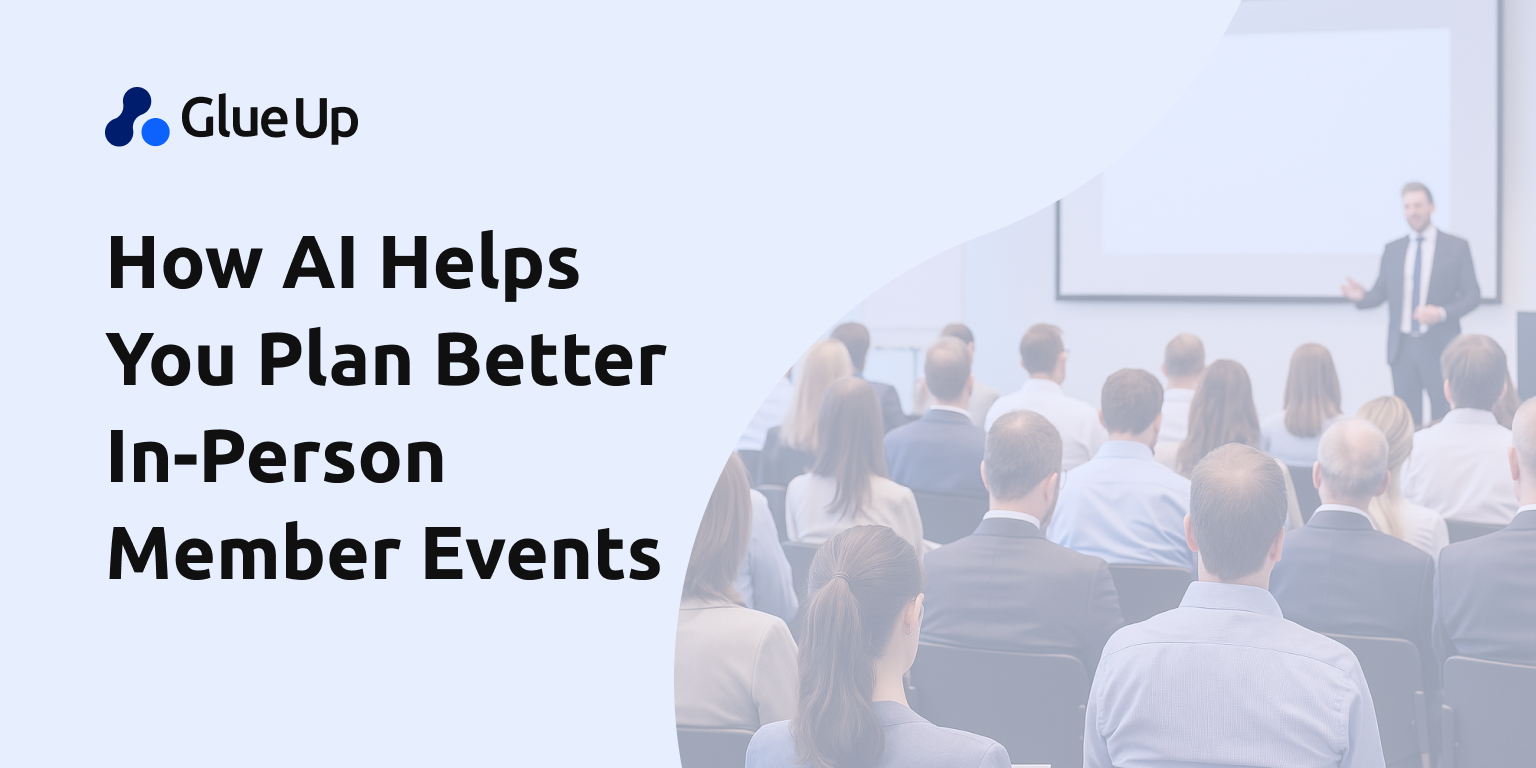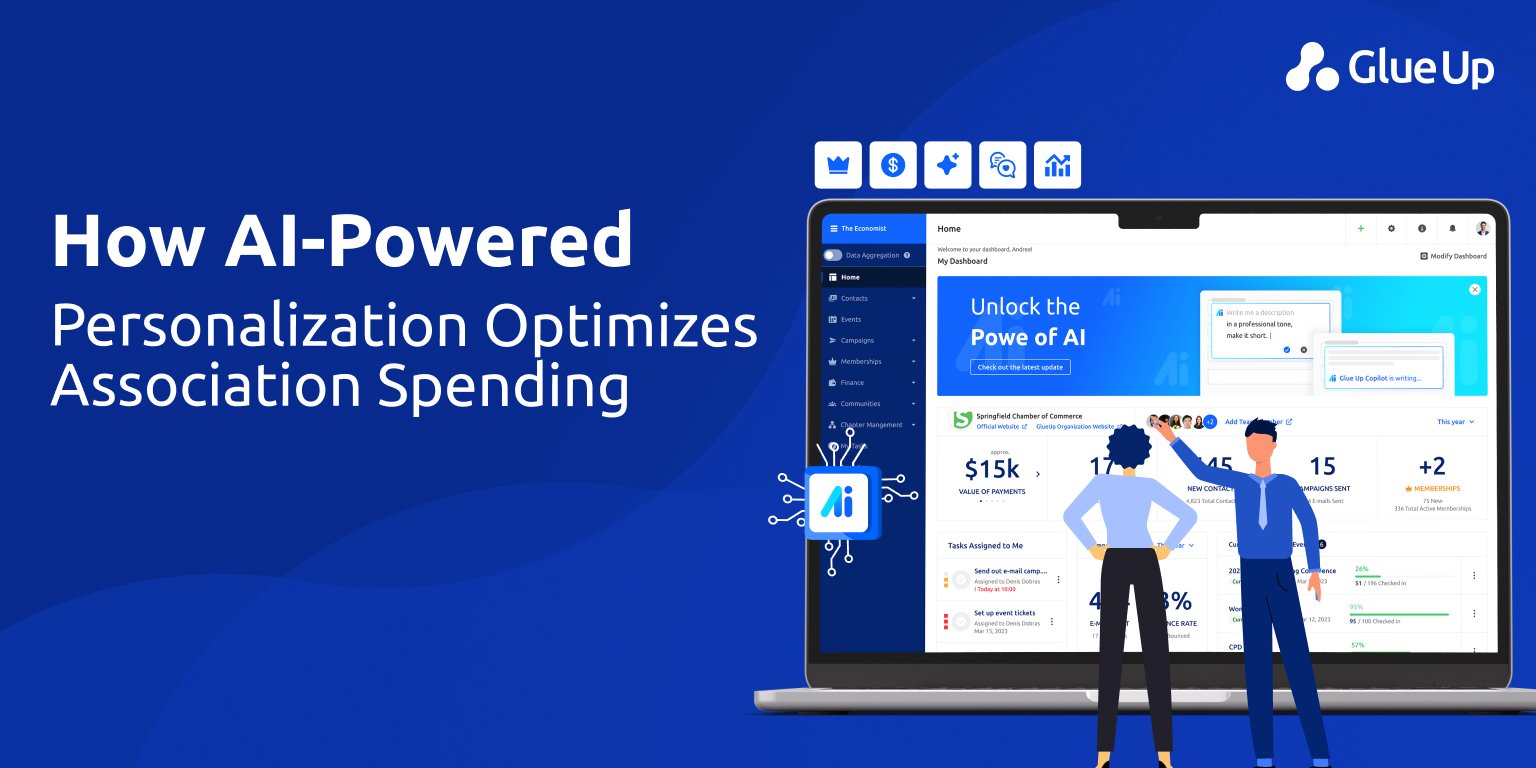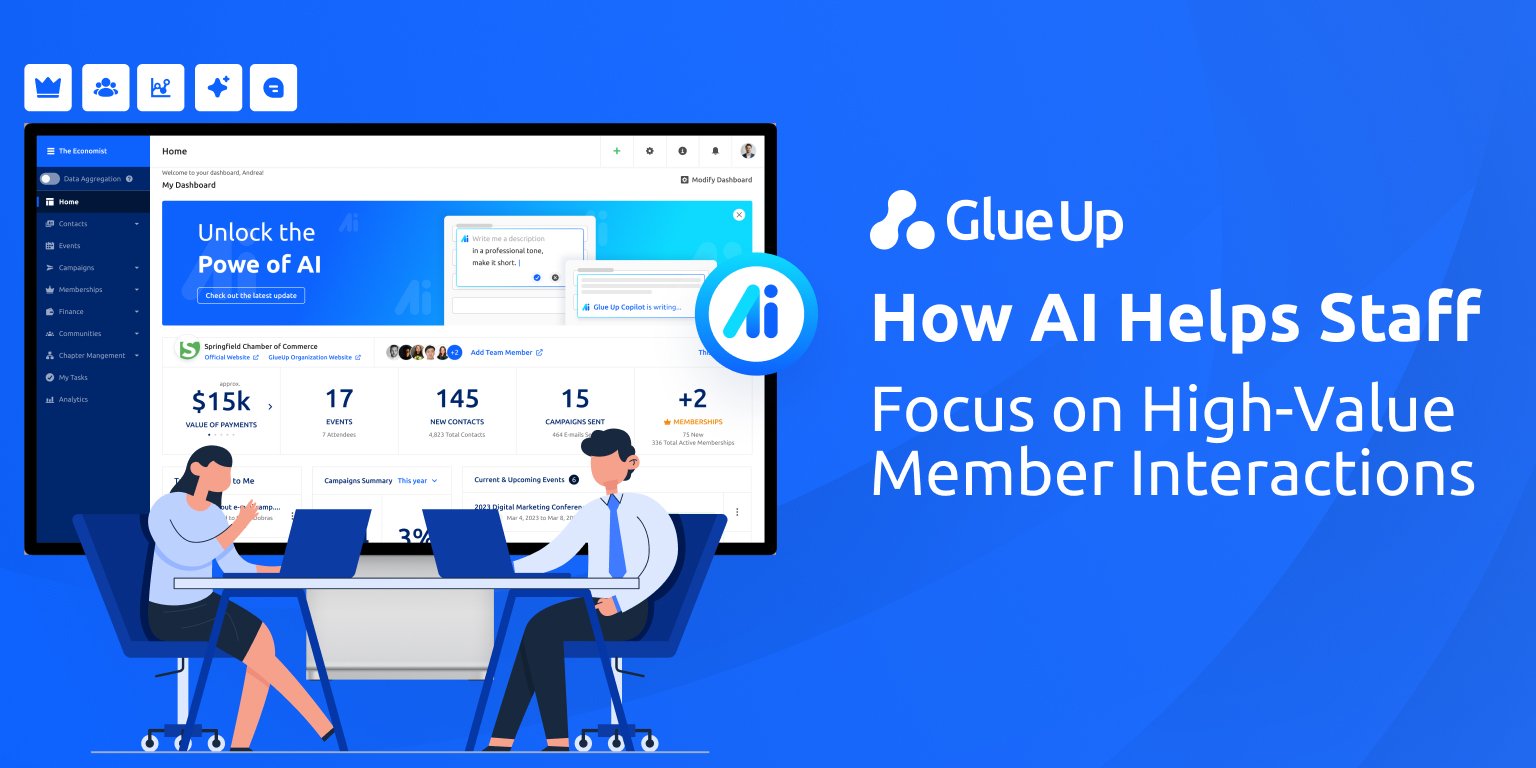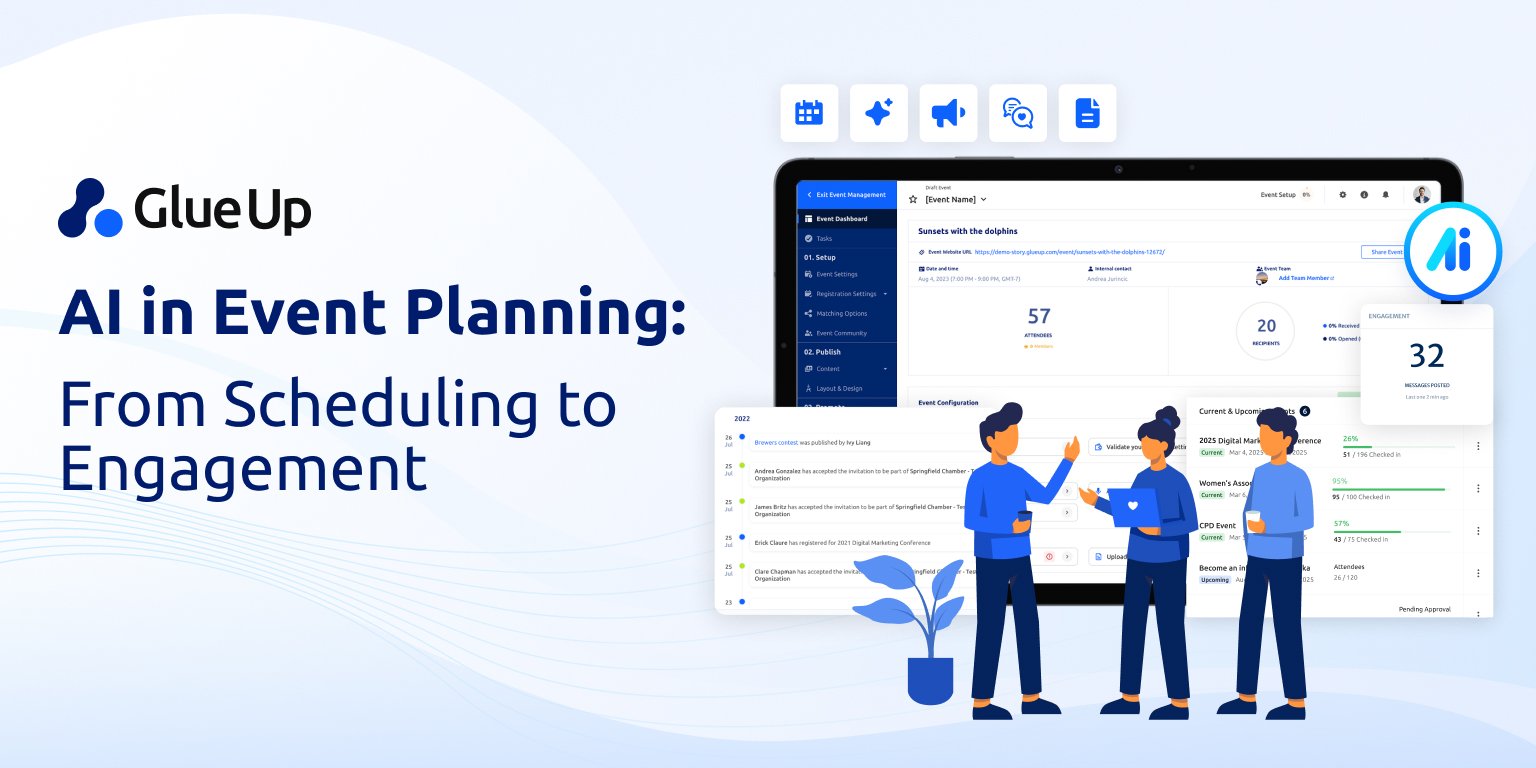
In-person events have always been a cornerstone of member engagement, but post-pandemic, they’ve gotten more complicated. Expectations have shifted. Attendees now want curated, personalized experiences. Organizers are under pressure to justify ROI. And the margin for error? Smaller than ever.
The problem is that most event planners are still working with outdated systems: a tangle of spreadsheets, email threads, and last-minute fixes. These systems are reactive, inefficient, and hard to scale.
That’s where AI comes in.
AI isn’t just about automating busywork. It’s about rethinking how events are planned, delivered, and measured. From registration flows to content planning to post-event engagement, AI can help you make smarter decisions faster, with fewer manual tasks and stronger results.
If you're running events for an association, chamber, or member-focused organization, now is the time to explore how AI can be the planning partner you didn’t know you needed.
Why Traditional Event Planning Can’t Keep Up
Event planning used to be about logistics: booking a venue, sending invites, and setting up a check-in table. But today, it’s about delivering meaningful experiences with measurable value, and most traditional methods aren’t built for that.
1. Personalized Experiences Are the New Baseline
Your attendees don’t want generic. They expect curated agendas, tailored recommendations, and smooth digital experiences. Without the right tech, offering that level of customization quickly turns into a manual, time-consuming challenge.
2. Manual Work Is Draining Your Team
From managing spreadsheets to tracking registrations and juggling multiple tools, planners lose hours each week on tasks that could easily be automated. Worse, these disconnected processes create more chances for human error, missed follow-ups, scheduling conflicts, or gaps in communication.
3. You’re Missing Out on Predictive Power
With traditional planning, everything is reactive. You wait for something to go wrong, then scramble to fix it. AI flips that model. It helps you anticipate attendance, optimize session times, and predict no-shows so you can plan instead of putting out fires.
Where AI Makes the Biggest Impact
AI doesn’t just simplify tasks, it reshapes how you think about event planning. Instead of reacting to problems, you’re predicting them. Instead of making decisions based on gut feeling, you’re using real data. Here’s where AI truly shines:
Tailored Attendee Experiences
AI analyzes data points like past attendance, behavior, and preferences to help you create personalized agendas, networking matches, and content tracks. It turns one-size-fits-all events into curated journeys for every member.
Smarter Content Planning
With AI-assisted tools, you can identify trending topics, suggest relevant sessions based on member roles or industries, and ensure your agenda actually aligns with what people want. It helps you build programs that are more than just busy; they’re strategic.
Forecasting Attendance and Resources
AI models can predict turnout with impressive accuracy, flag no-show risks, and even help with room assignments and catering estimates. That means fewer empty seats and better use of your budget.
Real-Time Optimization
During the event, AI helps you adjust on the fly, whether it’s reshuffling breakout rooms based on live attendance or nudging attendees to sessions they’re likely to find valuable. It keeps your event fluid, responsive, and high-performing.
Who Benefits Most:
- Associations & Chambers: Members stay longer, engage more, and feel like the event was designed for them.
- Corporations & Consultants: You get better lead quality, clear ROI metrics, and smarter reporting.
- Nonprofits & Training Providers: Stretch limited resources further and prove your impact with clean, data-backed results.
Real-World Examples of AI in Action
AI in event management isn’t hypothetical; it’s already powering events across industries. From registration to post-event follow-up, here’s how real organizations are using AI to make planning faster, engagement stronger, and outcomes clearer.
Smarter Networking Through AI Matchmakers
At member events and conferences, AI matchmaking tools use profile data and behavioral history to suggest the most relevant connections. Instead of leaving networking to chance, attendees meet the right people, and remember your event for it.
Predictive Attendance Models That Prevent Waste
Several organizations now rely on AI to forecast attendance weeks in advance. These predictions help avoid overbooking, reduce food waste, and ensure that every room, session, and resource is properly staffed.
AI-Assisted Scheduling That Adjusts in Real Time
Imagine assigning breakout sessions based on who actually shows up. With AI-powered scheduling assistants, some associations dynamically reconfigure session lineups to ensure rooms aren’t underfilled or overwhelmed.
Post-event Automation That Drives Follow-up
Rather than sending generic thank-yous, AI tools help trigger personalized follow-up emails based on session participation or survey feedback.
The Result?
Events run smoother. Members feel seen, and teams get to focus on impact instead of logistics.
What to Look for in an AI-Powered Event Platform
Not all AI tools are created equal. Some automate basic tasks. Others give you a real edge in strategy, engagement, and follow-up. If you're evaluating platforms, here are the must-have features to look for:
Smart Attendee Matching and Networking Tools
Your members want more than name tags and random chats. Look for AI that uses interests, roles, and behavior to recommend meaningful connections before, during, and after the event.
Predictive Analytics for Planning and Engagement
The right AI system should help forecast turnout, session popularity, and even potential drop-offs. This lets you fine-tune your agenda and staff more efficiently and avoid over- or under-investing in event elements.
Automated Content and Agenda Suggestions
AI can analyze trends, feedback, and attendee data to build smarter agendas. Instead of guessing what people want, you get recommendations that align with your audience’s interests and pain points.
Personalized Communications and Follow-up Workflows
From triggered emails based on session attendance to follow-up nudges that drive post-event surveys or renewals, these tools make it easy to continue the conversation. The result: stronger engagement and more measurable outcomes.
If a platform doesn’t offer these capabilities or integrate with your current tools, it’s not just outdated; it’s holding you back.
Ready to Plan Smarter Events? Start With Glue Up
Glue Up is an all-in-one, AI-powered event management software built specifically for organizations that host frequent, high-impact events. Whether you're running small member meetups or major conferences, Glue Up gives you everything you need to plan, promote, and execute events from a single platform.
You’re not just automating tasks, you’re making better decisions, creating more personalized experiences, and driving real results.
Here’s how Glue Up matches the AI advantages we’ve discussed:
AI-Powered Planning and Analytics
Predict attendance, track engagement, and access deep insights before, during, and after the event so you’re not guessing what worked.
Personalized Attendee Experiences
From smart registration forms to branded communications and mobile app engagement, Glue Up helps you create curated experiences at scale.
Real-Time Control, Wherever You Are
The Glue Up Manager App allows you to manage multiple events, scan tickets, print badges, and collect payments without a laptop.
Built-in Networking Tools
Let attendees connect through private groups, digital business cards, and 1-on-1 chats, all backed by Glue Up’s integrated CRM.
Faster Event Setup
Launch branded pages, set VIP pricing, and start collecting registrations in minutes using prebuilt templates and drag-and-drop design tools.
With Glue Up, you're not just managing events, you’re building stronger relationships, driving growth, and getting measurable ROI.
Book a demo today and see how Glue Up helps you run better events, backed by AI.



